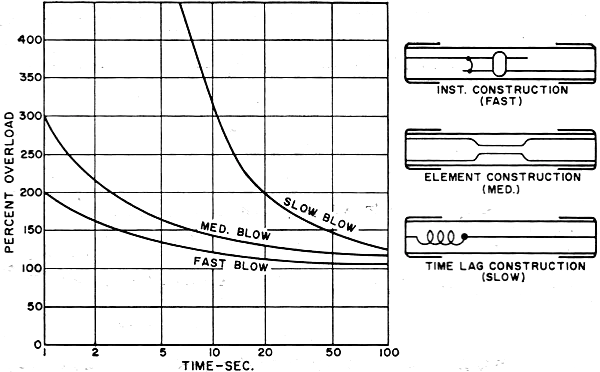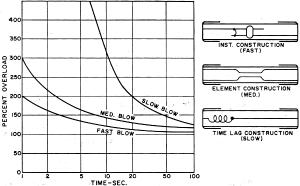
November
Fuses Protect You, Not Your Electronics (and they aren’t magic)
(Prompted by a question I answered here.)
Most electronics that generate any power at all are fused. According to the rating on the fuse, the fuse should blow long before there’s damage to the electronics. “It’s got a 4A fuse on it, how can it blow a 250W transistor?” But often, the (expensive) electronics seem to fail in order to protect the (cheap) fuse. What’s going on?
The answer is simple. Fuses conduct well over their rated power for a long time before blowing…more than long enough to destroy the semiconductor junctions inside a transistor or other sensitive electronic part.
The chart below shows the relationship between the % of overload and the time it takes a fuse to blow. Note that the times are in seconds, even for “fast-blow” fuses.

Even a fast-blow fuse conducts twice the rated current for one full second before blowing. This is more than long enough to destroy a transistor!
Meanwhile, this guy ran some tests with common automotive fuses, at truly ridiculous surge currents.
- A 5 Amp fuse conducted 120 Amps for 3ms before the fuse blew.
- A 15 Amp fuse conducted 150 Amps for over 10ms before the fuse blew.
- A 30 Amp fuse conducted 160 Amps for over 100ms before the fuse blew.
(This is why fuses don’t protect against lightning strikes.)
So why do devices have fuses at all? Houses have circuit breakers, right?
That’s because a short-circuit, especially on something powered by wall power, can easily start a fire. However, the circuit breaker in your house will only trip when the entire circuit is overloaded, at 15-20 Amps or more…and it doesn’t take nearly that much current to start a fire!
In contrast, a fuse can blow once a single device uses more power than it should, no matter how little that is…which protects you and your home against fires. But if the device is using far more power than it should, that probably means something inside has already failed.
In short, fuses are a great invention…but they’re primarily there to protect you, not your electronics.